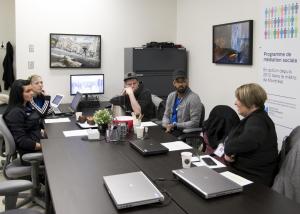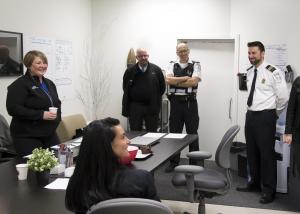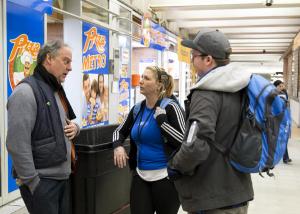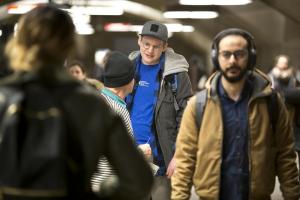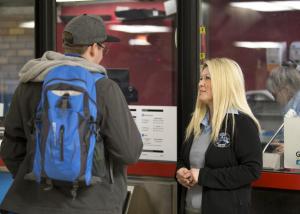We invite you to follow an intervention team from the Pôle de services en itinérance (PSI) in the métro, on a field visit in the Montréal métro network.
Homelessness is a complex social phenomenon that challenges many key players in society and for which responsibility is shared. As a result, STM is working with various partners in the community to implement concrete measures such as the Old Brewery Mission shuttle service for the winter period, the presence of the Médecins du Monde mobile clinic at various locations downtown since 2013, and the ongoing social mediation with the Société de développement social (SDS) that began five years ago. This concerted approach aims to show greater tolerance in the métro network, while ensuring a quality transit experience for customers.
We invite you to follow an intervention team from the Pôle de services en itinérance (PSI) in the métro, on a field visit in the Montréal métro network.
Daily meeting point at the SDS premises where the psychosocial intervention team, made up of 8 responders (in the photo from left to right: Karine-Isabelle Sylvain, Céline Côté, Antoine Auger-Morin and Michaël Marois-Boucher), under the supervision of Sylvia Rivès, the Director of the Pôle de services en itinérance at the SDS, allocate work and choose the itineraries for the day.
Discussion between psychosocial professionals and Patrick Bibeau, Station Manager, Stéphan Chauvette and Pierre-Olivier Pharand, both lieutenants of Safety and Control department. They can share their concerns regarding individuals they have met in the métro who may need psychosocial support. Teamwork helps establish a strategy to find a solution to a problem.
On the mezzanine level of the Berri-UQAM station, the SDS responders talk with Jean Bellemare, a maintenance employee, as part of their morning rounds. Céline and Antoine collaborate closely with the métro network employees, such as ticket booth attendants, STM inspectors, etc. Indeed, they may be called upon to collaborate with SDS responders to inform them of any situation that may require their attention.
In the corridors of the Berri-UQAM station, two SDS professionals talk with a homeless person. They may take different measures depending on the person’s situation. It may be anything from a simple conversation to ensure the person is well, to a referral or accompanying a person to a resource or service suited for their needs, when appropriate. The responders may also give the person a transit fare to help him reach the identified resource more easily.
The service points for the homeless (PSI) is a model of social inclusion that both works and inspires. The social mediation team has gone from a single psychosocial professional, handling 430 interventions in the métro in 2012, to 8 psychosocial professionals, handling more than 3,500 interventions in 2017. Over the last five years, early 400 people benefited from the support and guidance of the mediation team.
The SDS, STM and all the partners involved in the program prove that by working together with a common goal, it is possible to find sustainable solutions to issues as major as homelessness and social exclusion.
At the Espace Client booth at the Bonaventure station, Marcela Viviana Chandia, a ticket booth attendant, checks in with Antoine. Ticket booth attendants often collaborate or share information with the responders because their centralized position in the métro station allows them to see or be in regular contact with homeless people and customers in general.
Back at the SDS premises, the psychosocial professionals write up their daily reports and list their interventions of the day. An important step of the programme is accountability, this guarantees an optimal follow-up of each of the situations encountered during the interventions and ensures no one is left behind and everyone may receive the help and support needed. To simplify this step, each SDS responder is equipped with an application that allows him/her to enter the intervention data in real time straight from his/her smartphone.
Last January, the SDS and STM renewed the service points for the PSI in five métro stations downtown for a period of three years, in a bid to continue to meet the growing needs of homeless people taking refuge in the métro. The PSI program is made possible thanks to financial contributions by the STM, the Fondation J.A Bombardier and the Fondation de la Corporation des Concessionnaires Automobile de Montréal.
Photo by Louis-Étienne Doré, photographe

